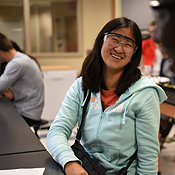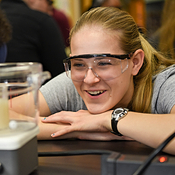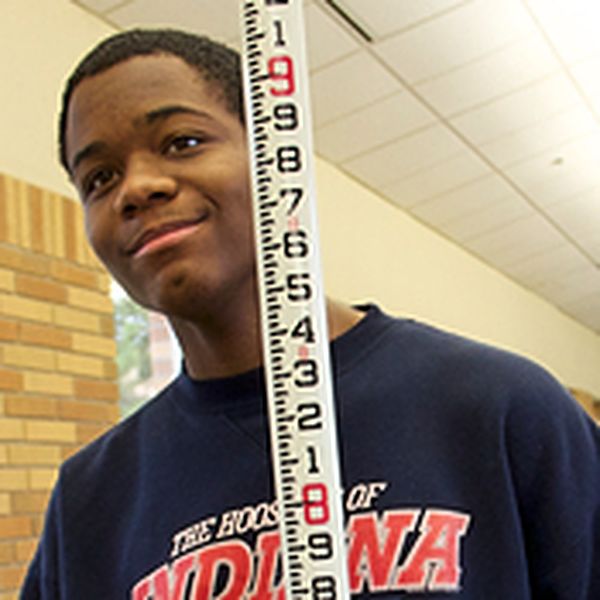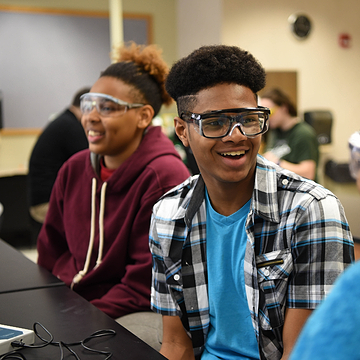Career Readiness Starting in High School
Each PLTW Engineering course engages students in interdisciplinary activities like working with a client to design a home, programming electronic devices or robotic arms, or exploring algae as a biofuel source. These activities not only build knowledge and skills in engineering, but also empower students to develop essential skills such as problem solving, critical and creative thinking, communication, collaboration, and perseverance.
-
This new course, coming Fall 2026, is designed to prepare students in grades 10–12 and opens the door to the high-tech, high-wage careers powering today’s innovation economy.
Whether students are just starting their journey in engineering or building on prior experience, this course immerses them in the exciting world of Industry 4.0—where semiconductors, automation, AI, machine learning, cyber-physical systems, and data analytics converge to transform how we design, build, and maintain everything.
Available for the 2026-27 school year.
-
Students explore the breadth of engineering career opportunities and experiences as they solve engaging and challenging real-world problems like creating a natural relief center system or creating a solution to improve the safety and well-being of local citizens.



-
Students dig deep into the engineering design process, applying math, science, and engineering standards to hands-on projects like designing a new toy or improving an existing product.
-
Students explore how modern engineers help improve the world through diverse engineering fields, such as product design, mechanical design, infrastructure, and sustainability. Students learn and use some of the cutting edge tools engineers use in robotics, 3D modeling, programming, and prototyping.
-
Students explore the physics of flight and space through software simulations and hands-on experiences. They bring concepts to life by designing and testing an airfoil, propulsion system, and a rocket. Students learn how these concepts apply to a career in aerospace engineering and other engineering fields.
-
Students learn important aspects of building and site design and development, and then they apply what they know to design a commercial building.
-
Students discover and explore manufacturing processes, product design, robotics, and automation, and then they apply what they have learned to design solutions for real-world manufacturing problems.

-
Using Python® as a primary tool, students develop computational-thinking skills and tackle challenges like designing apps to solve real-world problems for clients.
-
Students explore the foundations of computing by engaging in circuit design processes to create combinational logic and sequential logic (memory) as electrical engineers do in industry.
-
Students investigate and design solutions in response to real-world challenges related to clean and abundant drinking water, food supply, and renewable energy.
-
Students engage in an open-ended research experience in the PLTW Capstone course, a culminating program for those completing PLTW's high school offerings. They collaborate in teams, designing and developing original solutions to well-defined and justified real-world problems.
Explore Opportunities for Credentials and College Credit
Industry-Recognized Credentials (IRCs)
ACE College Credit
Prepare Today's Students for Tomorrow's Careers
Build students’ collaboration, teamwork, and communication skills so they can be ready to step into their future careers. Explore the links below to learn how PLTW alumni apply that knowledge in life and career – and learn about college credit opportunities through the American Council on Education here.
Our Approach to Standards Connection is Focused on Student Outcomes and Flexibility.
Our programs are designed to empower students to thrive in an evolving world.
As a part of this process, we take standards connections into account when developing and updating our curriculum.
We define connections as:
- Students complete a designated task(s) that demonstrates the outlined knowledge and/or skills of the specific standard or objective.
- Our multidisciplinary programs align to a variety of standards and provide districts and schools with the flexibility to tailor programs to meet their specific state or local requirements as needed.
PLTW Engineering Pricing
The PLTW Participation Fee is invoiced annually and does not increase with added courses or program expansion. Pricing subject to change.
Annual Participation Fee
PLTW schools participate on an annual basis, with year-long, uninterrupted access to hands-on, relevant curriculum for teachers and students.
$3,200
(*High School programs can be combined and max at $5,400.)
Professional Development
PLTW Core Training immerses teachers in a hands-on, collaborative learning environment, challenges them to look at their classrooms in a new way, and empowers them to bring learning to life with PLTW.
$2,400
Unlocking Real-World Skills for All Students
With PLTW Engineering you can:
- Prepare students with career readiness skills for the roles they want and the reality they will face in college and beyond.
- Inspire deeper learning with real-world experiences using the same tools and software used by professionals in engineering roles.
- Equip students to succeed by practicing skills like collaboration, teamwork, and communication in the classroom.

Start Transforming Your Classrooms
-
Explore Our Curriculum
See how our pathways in computer science, engineering, and biomedical science make for a comprehensive PreK-12 learning experience.
-
Plan for PLTW
Plan for a lasting, strong program with support from PLTW throughout your implementation and beyond.
-
Discover the Difference
See how thousands of PLTW students and alumni across the country are unlocking their potential and thriving in college, career, and beyond.





